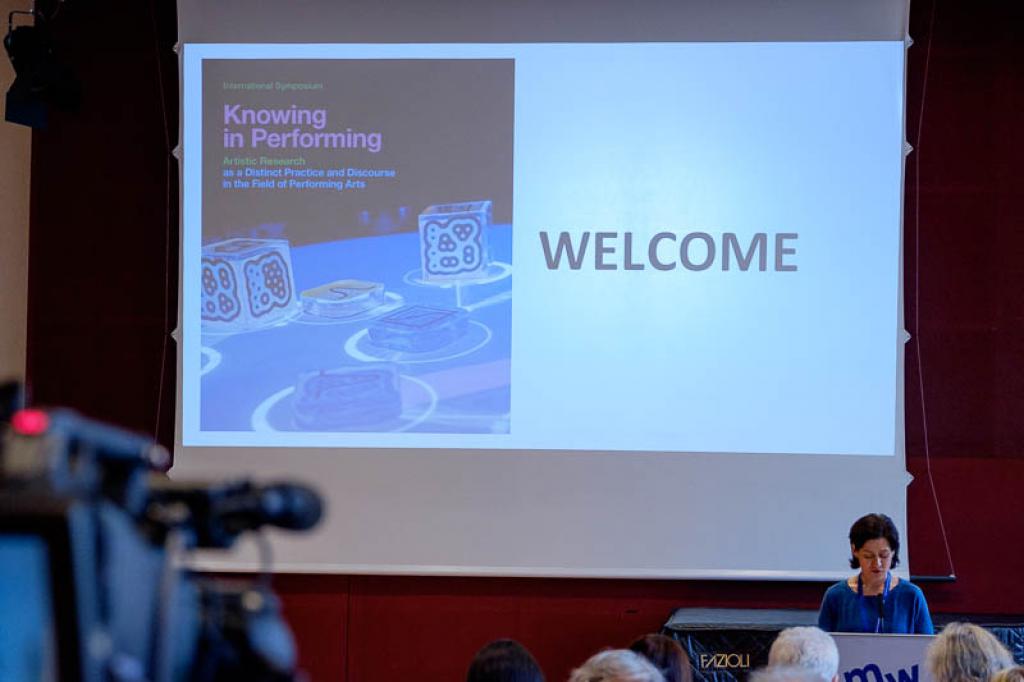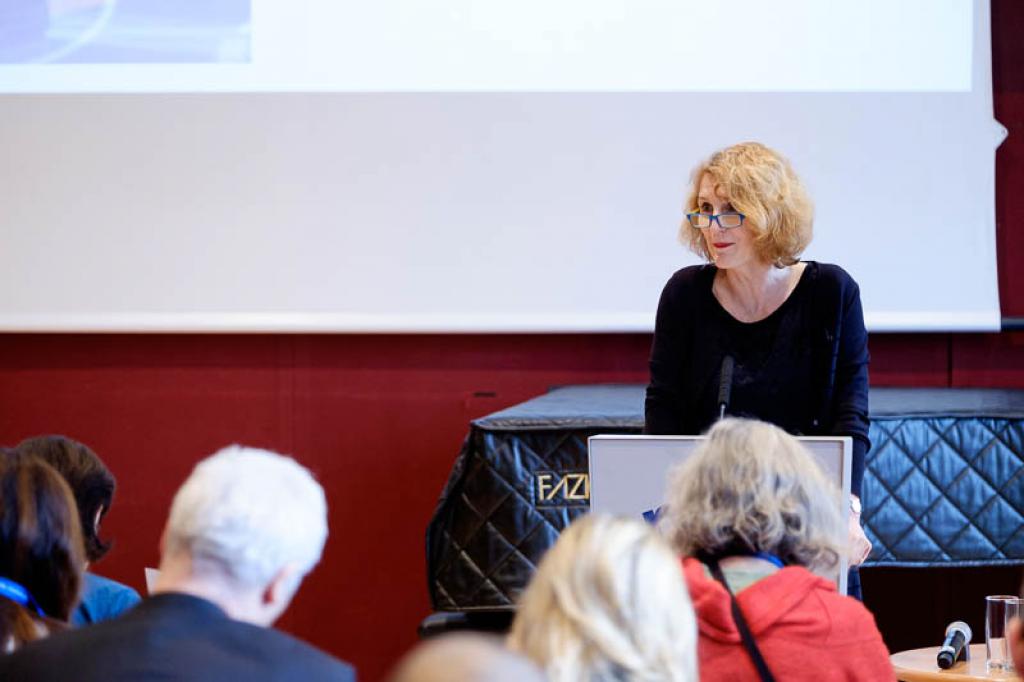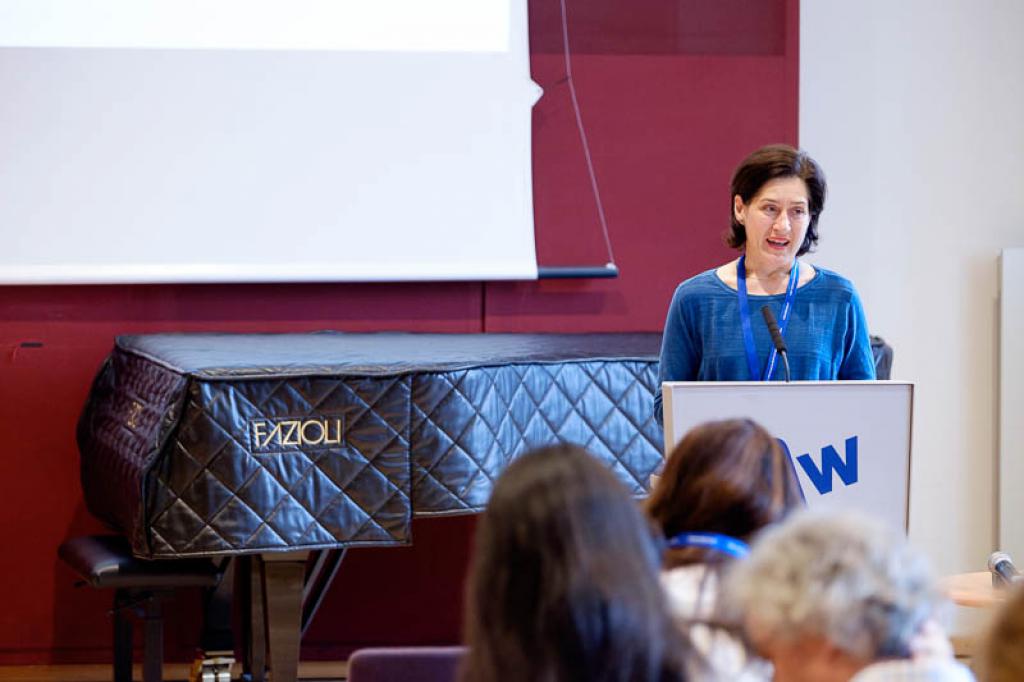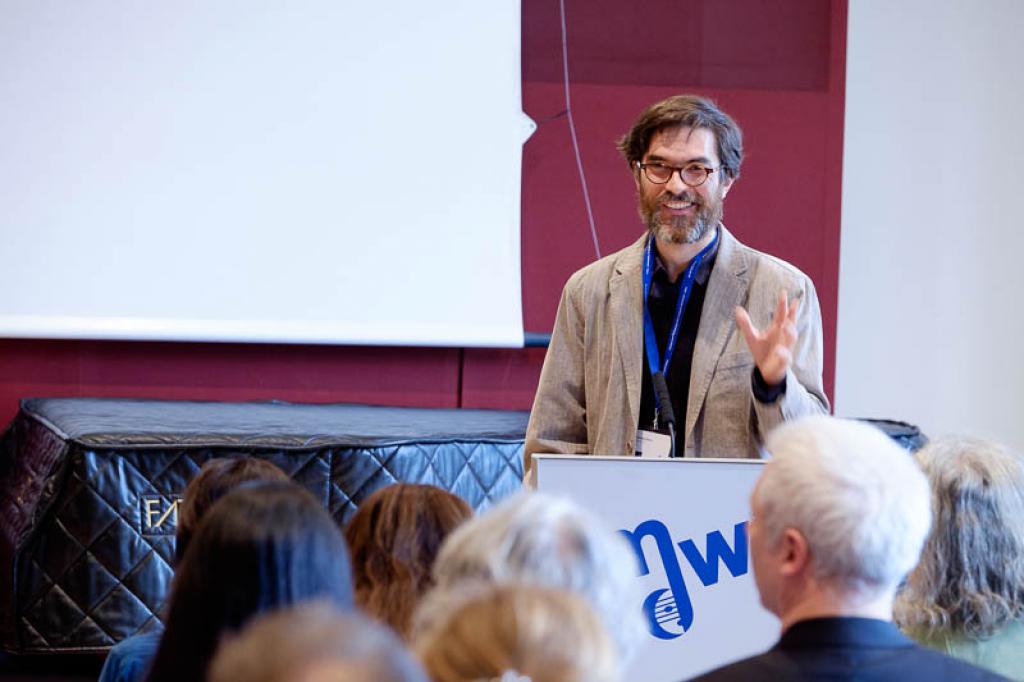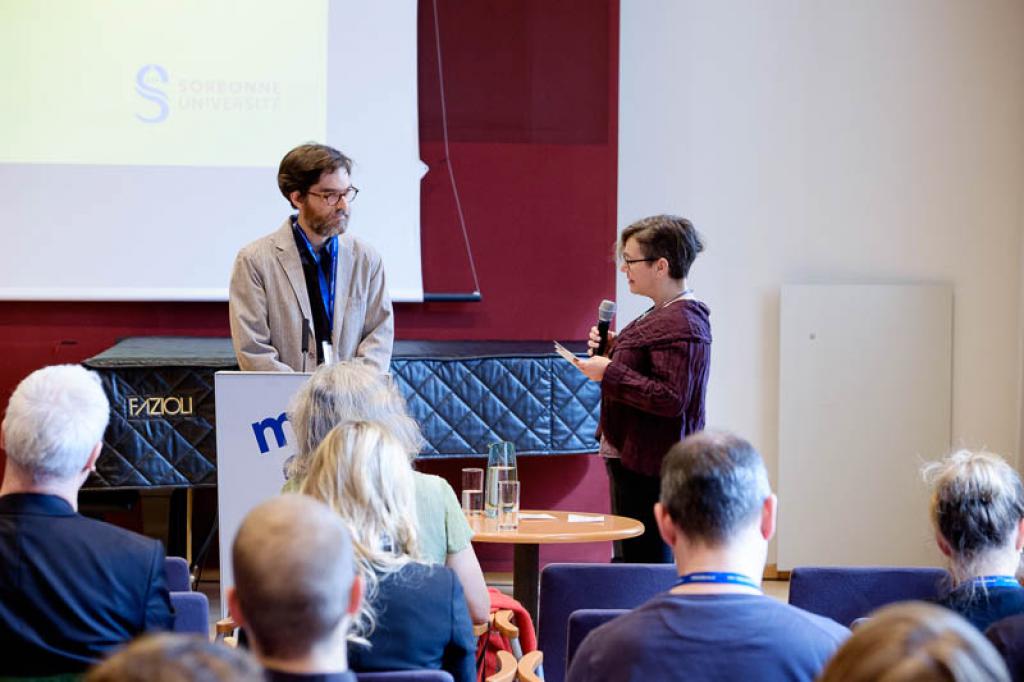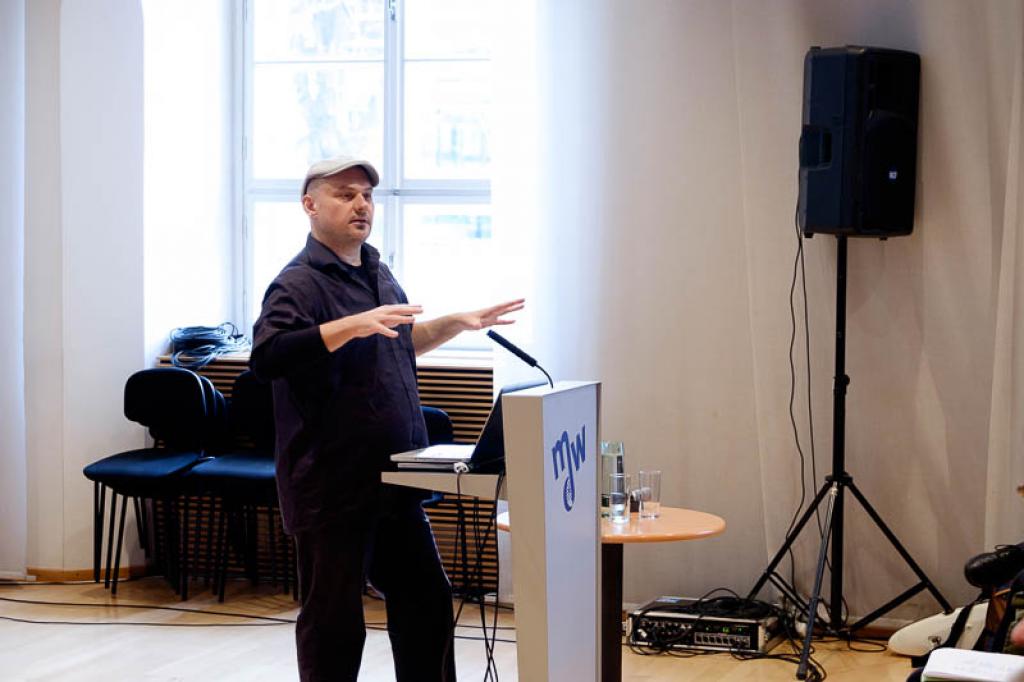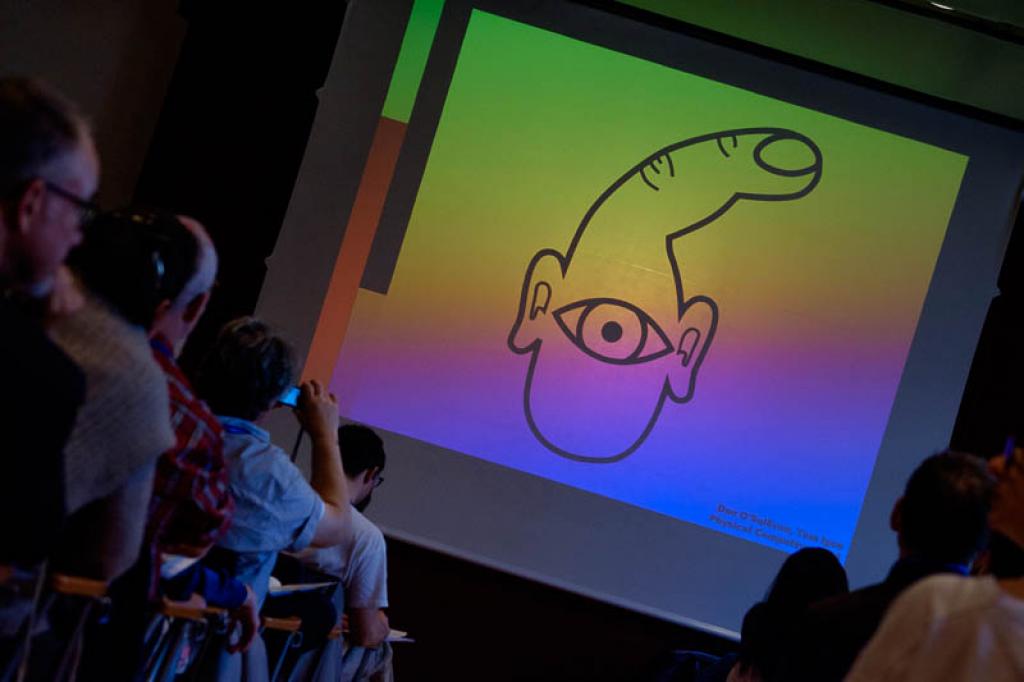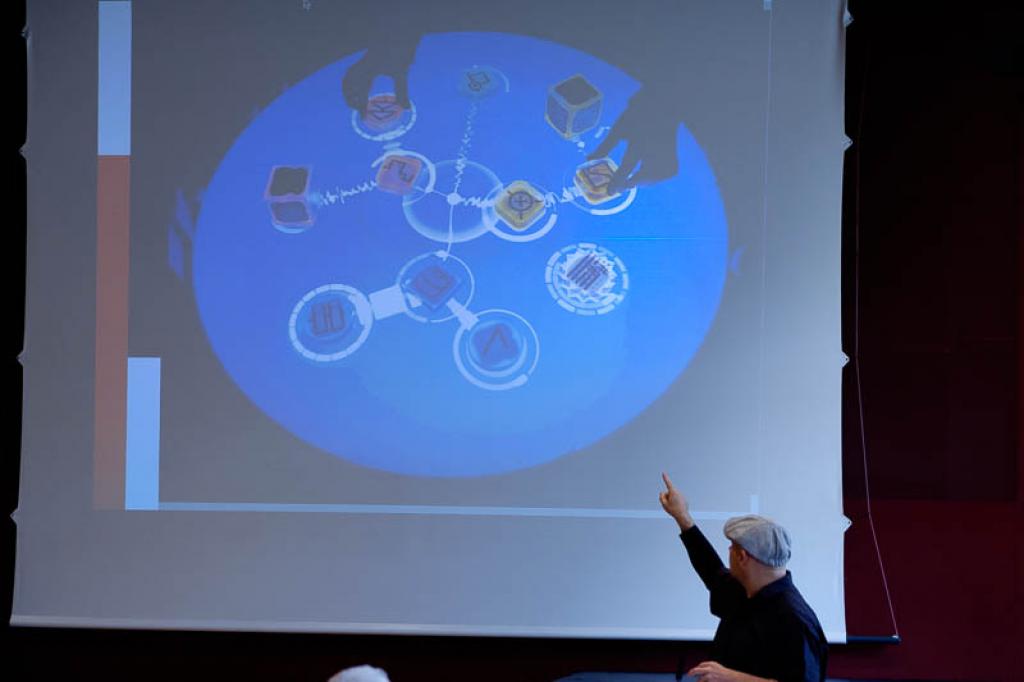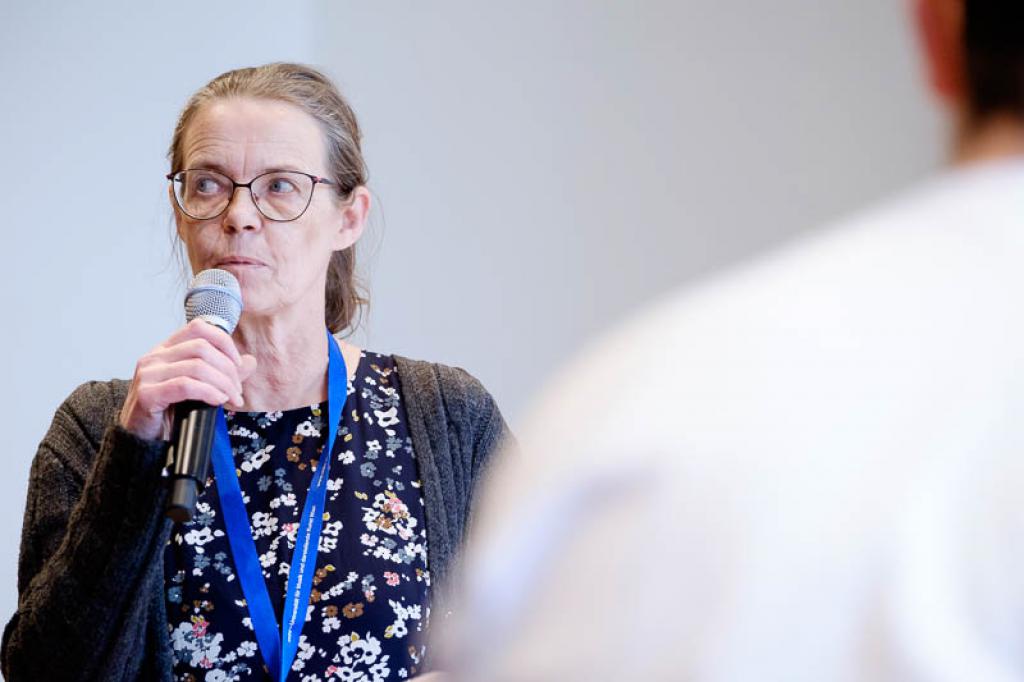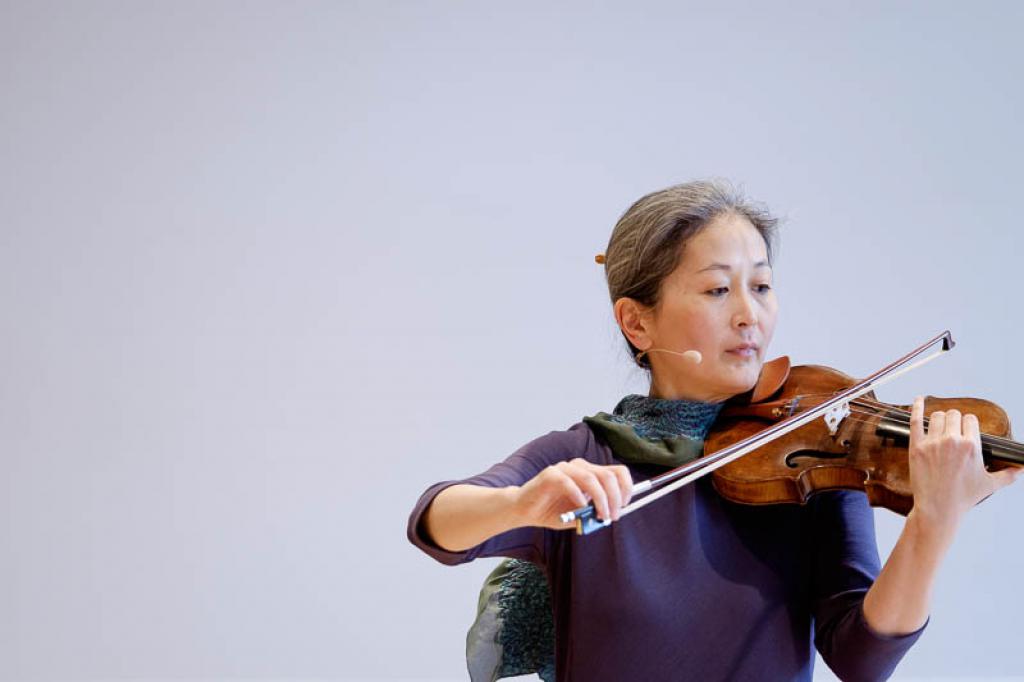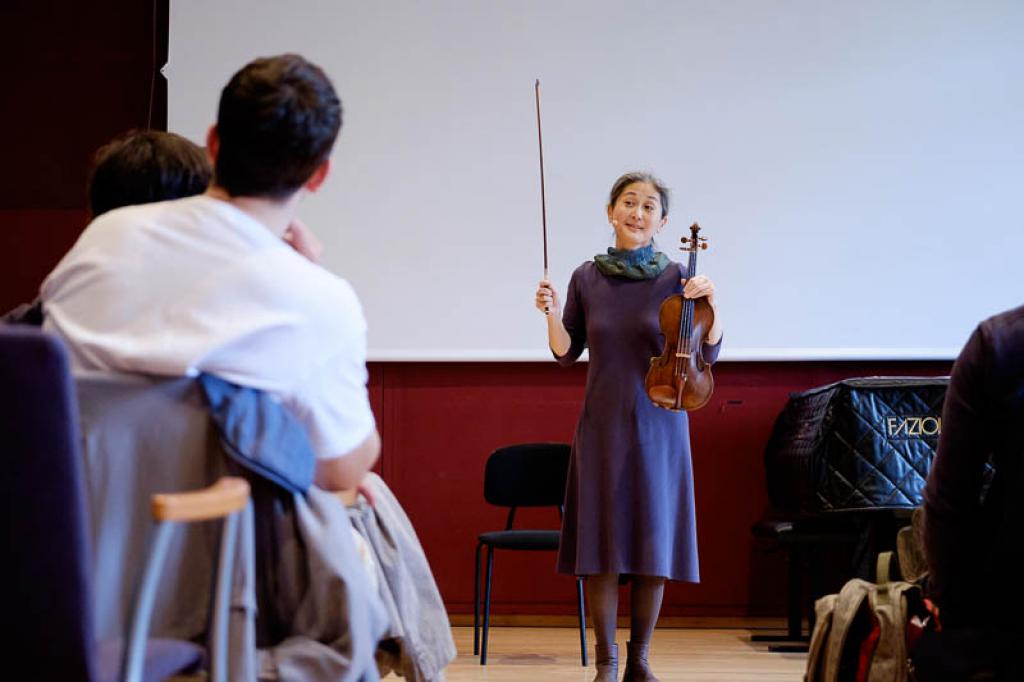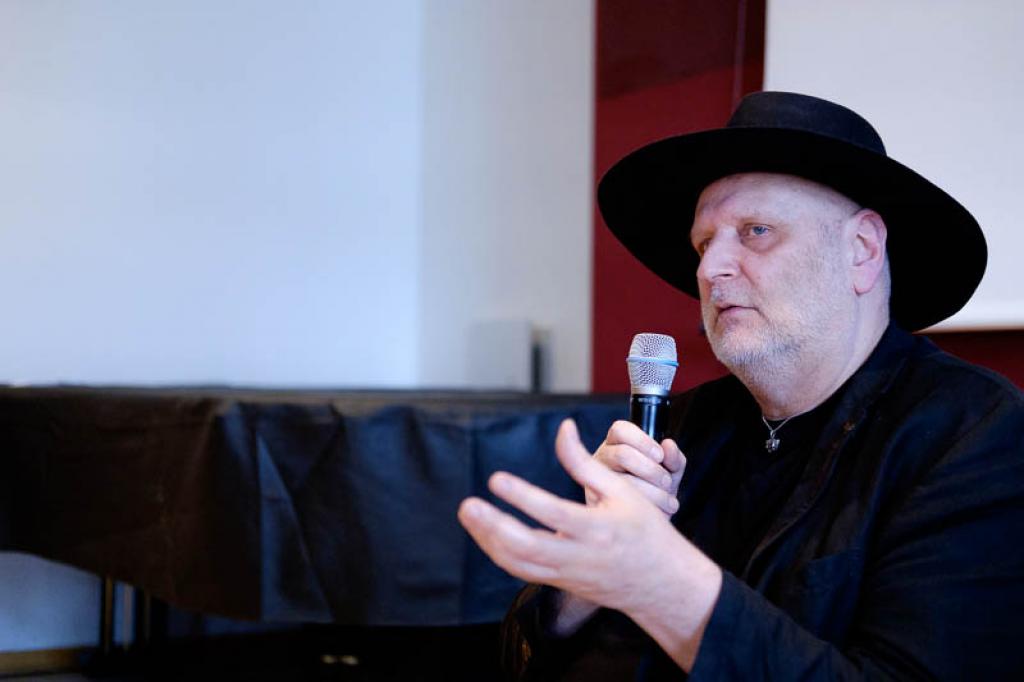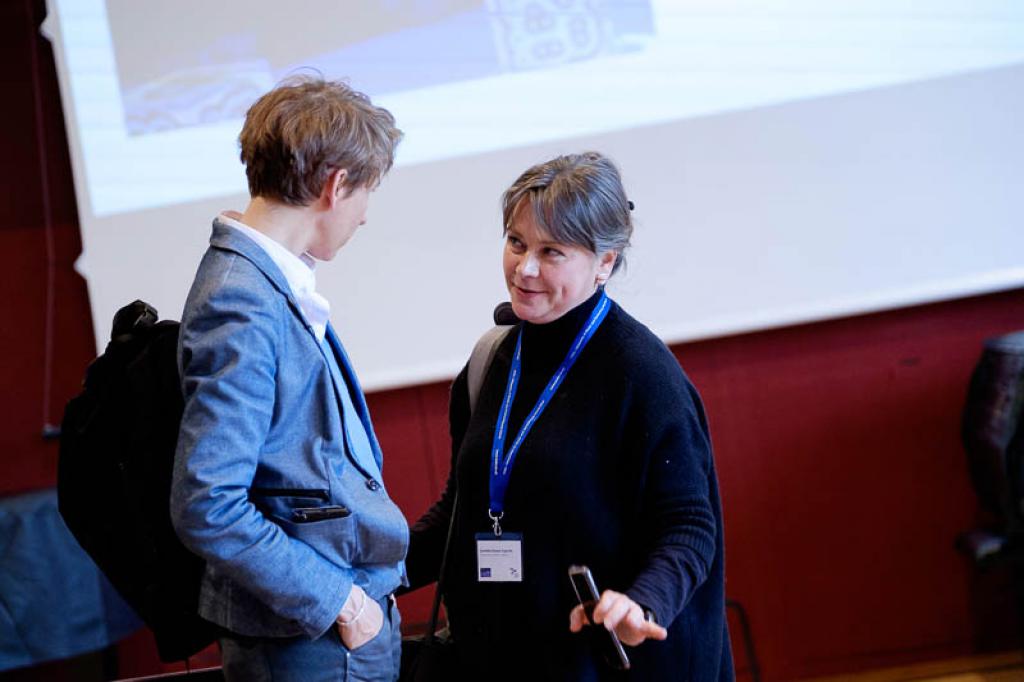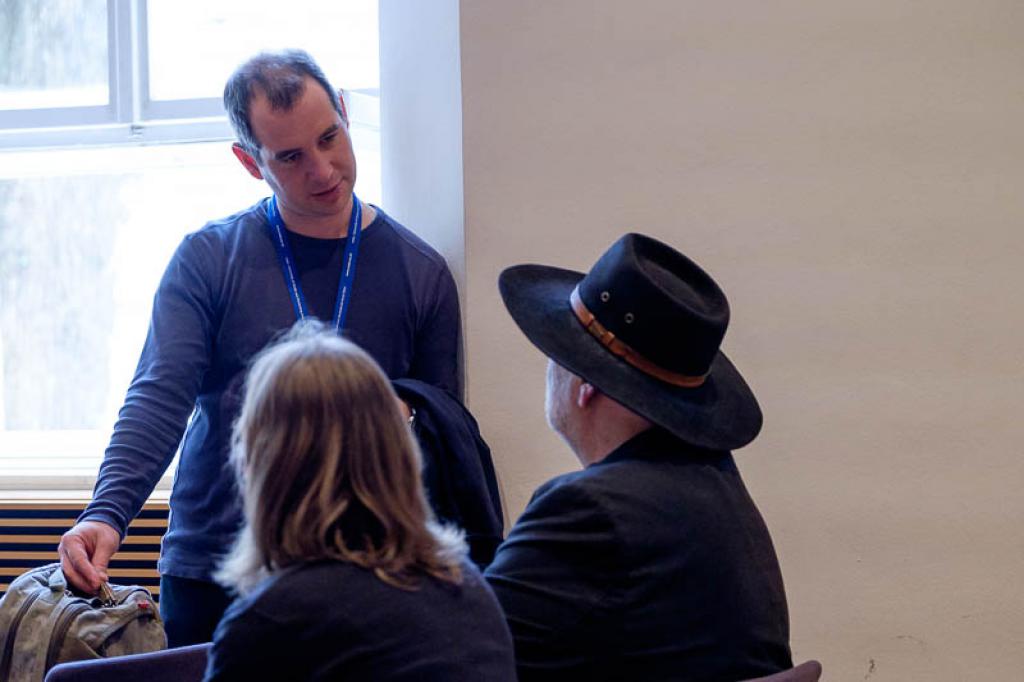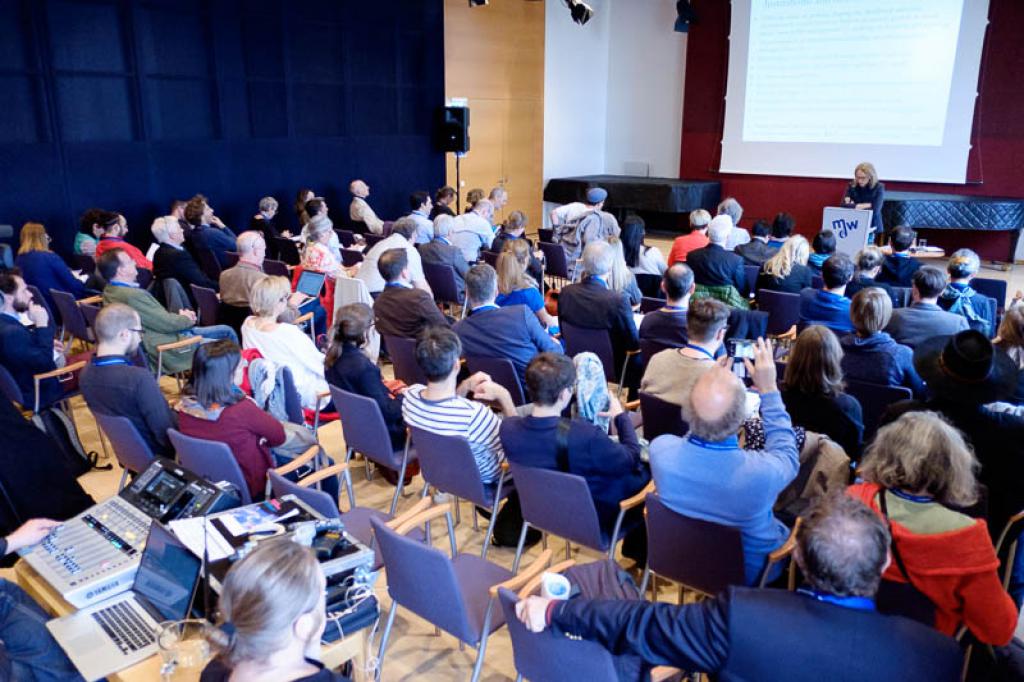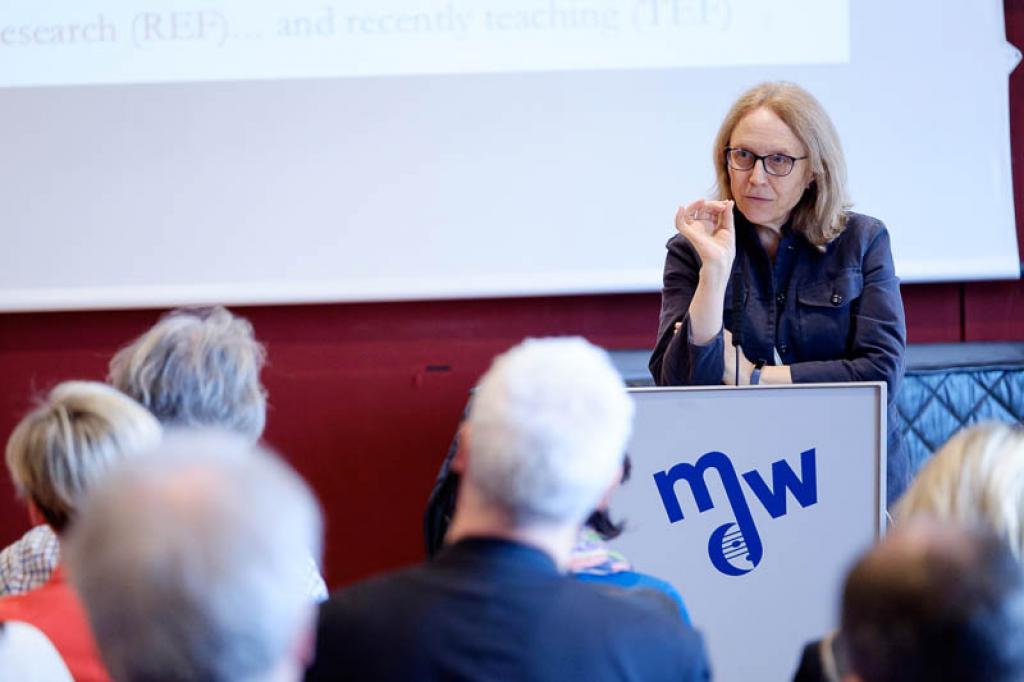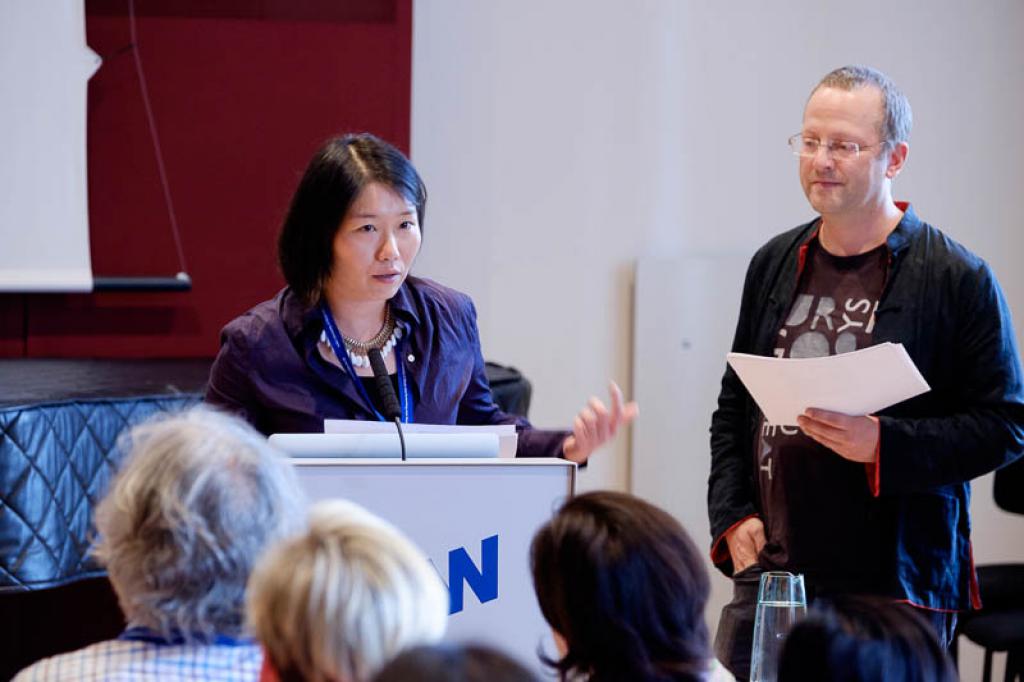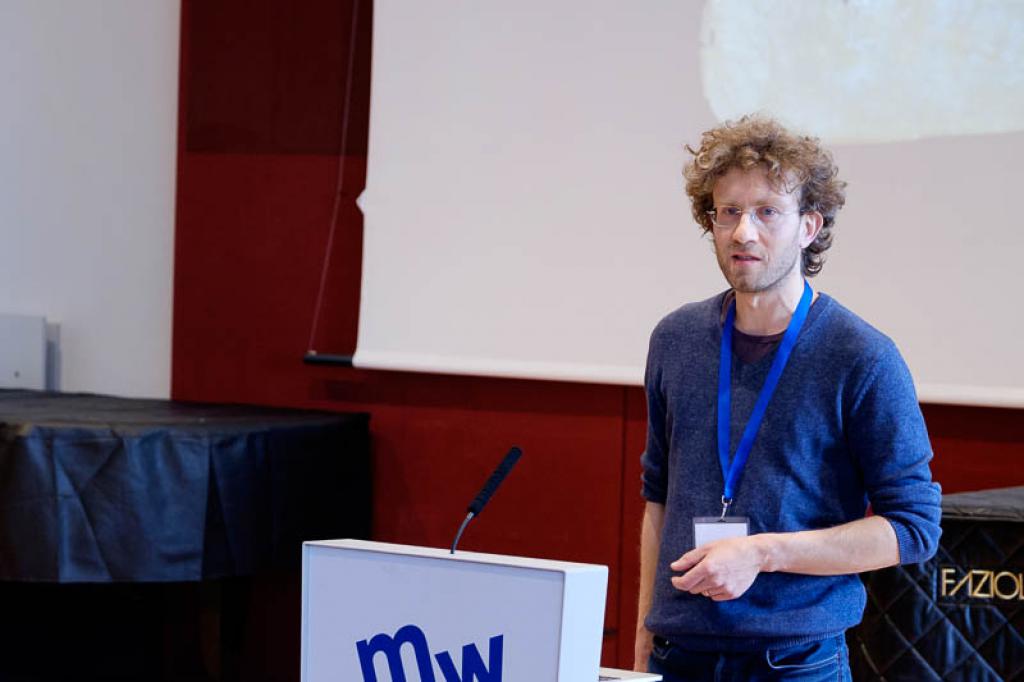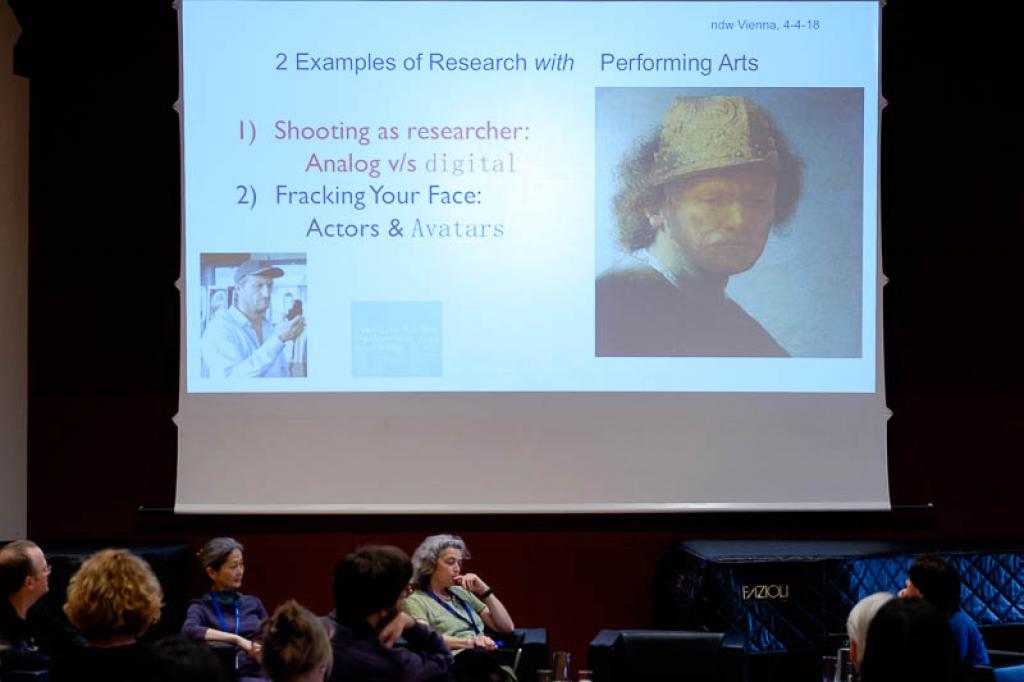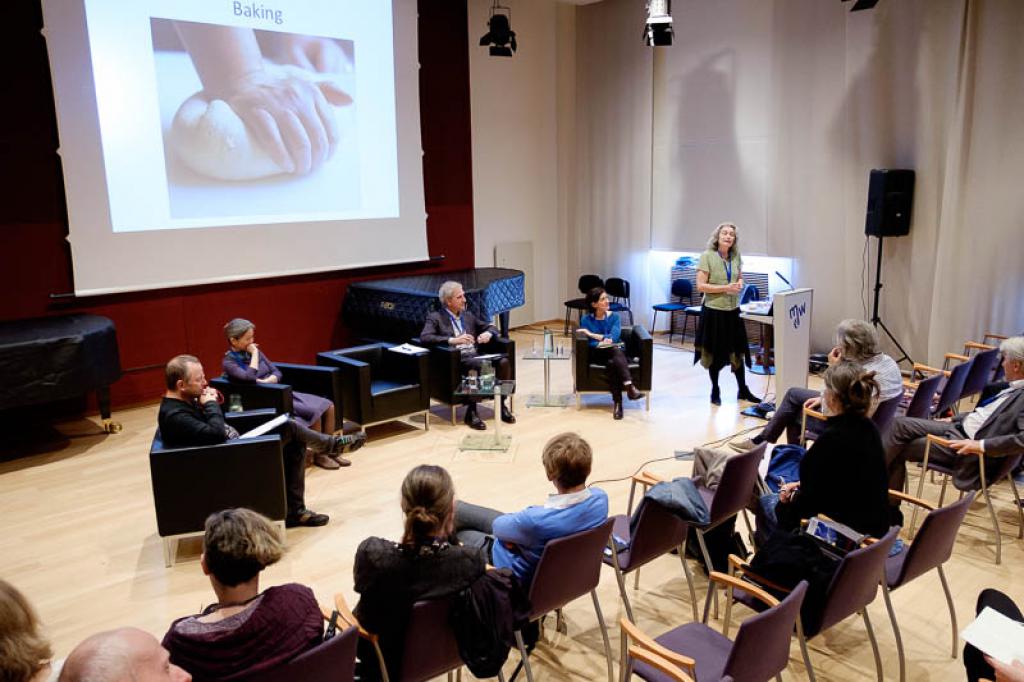Knowing in Performing
Artistic Research as a Distinct Practice and Discourse in the Field of Performing Arts
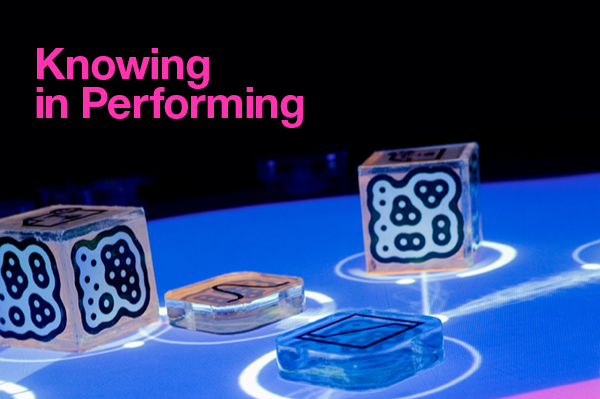 Photo: ©Xavier Sivecas
Photo: ©Xavier Sivecas
4 April 2018, 9.30 am – 6.00 pm
mdw – University of Music and Performing Arts Vienna
Fanny Hensel Hall
Anton-von-Webern-Platz 1
1030 Vienna
UPDATE: Photos of the event
Artistic research as it has emerged and evolved over the last three decades is related to an increasing interest in epistemological questions as well as an interrogation of how artistic practices constitutively support and instigate processes of knowledge creation. Art is thus being looked at both as an object and a medium of research, becoming part of a general discourse on knowledge regimes and research models.
The symposium will investigate this dynamic, ever-renewing field of interrelations with a special focus on the performing arts. Highlighting the issue of various implementation models in curricula and study programmes in higher arts education, it will critically analyse international institutional policies and facilitate an open debate on how to integrate current practices and discourses into future teaching and research structures.
Registration: knowinginperforming@mdw.ac.at
For requests and further information, please contact:
Therese Kaufmann
Tel.: +43 1 71155-6100
E-Mail: kaufmann-th@mdw.ac.at
Bojana Tesan
Tel.: +43 1 71155-7410
E-Mail: tesan@mdw.ac.at
Programme
Please note: Times have changed!
9.30 am – 9.40 am
Opening
Rector Ulrike Sych
Therese Kaufmann, mdw
9.40 am – 10.40 am
Keynote
Composers and self-analysis: from anti-theoretical stance to artistic research method
Nicolas Donin, IRCAM, Paris
Chair: Annegret Huber, mdw
10.40 am – 11.25 am
Post-Digital Lutherie at the Tangible Music Lab
Martin Kaltenbrunner, University of Art and Design, Linz
Chair: Peter Plessas, mdw
11.25 am – 11.45 am
Break
11.45 am – 12.30 pm
Quiet is beautiful
Mieko Kanno, UniArts, Helsinki
Chair: Gesine Schröder, mdw
12.30 pm – 1.20 pm
Risking One's Own Sovereignty: Transdisciplinary Research, Context-Oriented Performances and the work of Theater der Versammlung (Theater of Assemblage)
Jörg Holkenbrink, Center for Performance Studies, University of Bremen
Chair: Doris Ingrisch, mdw
1.20 pm – 2.30 pm
Lunch Break
2.30 pm – 3.30 pm
Keynote
Artistic Research, Music Research, and Inter/Transdisciplinarity: Strengths, Limitations, and Institutional Conditions
Georgina Born, University of Oxford
Chair: Tasos Zembylas, mdw
3.30 pm – 3.50 pm
Presentation of successful PEEK-projects at the mdw:
Johannes Kretz, Wei-ya Lin
Creative (mis)understandings. Methodologies of Inspiration
Thomas Grill
Rotting sounds. Embracing the temporal deterioration of digital audio
3.50 pm – 4.10 pm
Break
4.10 pm – 5.45 pm
Short Film
Helen Hideko Aihara Parkes: Jabberwocky of Kodi
Panel Discussion
Institutional Policies and Current Practices
Kathleen Coessens, Orpheus Institute, Ghent
Mieko Kanno, UniArts, Helsinki
Anton Rey, Zurich University of the Arts/PEEK
Chair: Therese Kaufmann, Johannes Kretz, mdw
5.45 pm – 6.00 pm
Conclusions
Informal Get-together
Abstracts and Biographies
Artistic Research, Music Research, and Inter/Transdisciplinarity: Strengths, Limitations, and Institutional Conditions – Georgina Born
Artistic Research, Music Research, and Inter/Transdisciplinarity: Strengths, Limitations, and Institutional Conditions
On the presumption that we have reached a critical watershed in the institutionalization of a particular paradigm of artistic and music research, in this presentation I comparatively address the nature of artistic and music research.
Through case studies I probe the forms of inter- and/or transdisciplinarity that both fields of practice claim to embody, and I address the institutional conditions that have favoured their emergence and their current hegemony. Across this material I ask a series of questions, identifying certain strengths and limitations and probing the losses as well as gains manifest in this new paradigm.
These include:
Are the claims made for the potential epistemic status of art in artistic research (e.g. Borgdorff 2012, citing Rheinberger) convincing, and can they also be applied to music research?
Music research has taken very particular historical forms, so is the way 'research' is understood consistent or should it in fact be differentiated when addressing music and art?
Should the term therefore be understood historically and in relation to specific path-dependent historical developments in music and in the specific performance and plastic arts, rather than a-historically, as is often the case?
Are the elements portrayed as specific to artistic or music research – for example, an ‘originality’ criterion, by which is meant ‘innovation in content, form, or technique’ assessed with reference to context (Borgdorff) – actually very different from the criteria applied to scientific or technical knowledge, or indeed humanities or social scientific research?
Is the ascendance of the university and of the PhD as instruments for the cultivation of artistic and music research to be welcomed, or, paradoxically, does this enact a reduction in the diversity of institutional forms and knowledge formats through which art and music were previously supported and disseminated?
And perhaps most controversially, is there a fundamental – if perhaps disguised – instrumentality embedded in the ascendance of the paradigm of artistic research?
Georgina Born is Professor of Music and Anthropology at Oxford University. Earlier in her life she worked as a musician on cello and bass guitar. She studied anthropology at University College London at BSc and PhD levels, being awarded her PhD in 1989 for an ethnography of IRCAM, the computer music institute in Paris. Born’s work combines ethnographic and theoretical writings on music, media and cultural production. Her ethnographies often focus on major institutions – television production at the BBC, computer music at IRCAM, interdisciplinary art-science and new media art at the University of California, Irvine.
Georgina Born has held a number of distinguished international visiting professorships. In 2014 she was elected a Fellow of the British Academy, where she chairs the Culture, Media and Performance section, and in 2015 she was elected to Academia Europaea.
Post-Digital Lutherie at the Tangible Music Lab – Martin Kaltenbrunner
Post-Digital Lutherie at the Tangible Music Lab
Situated between art and technology, the design of digital musical instruments is an ideal experimentation field for art-based research. Tangible User Interfaces promise to provide a new approach to post-digital instrument design, which allows to reinterpret the physical value of well established cultural techniques and design patterns from traditional lutherie in combination with novel interaction design and digital processing.
In the context of the "metamusic" PEEK project Mag. Reinhard Gupfinger develops musical instruments which are suitable for the cognitive and physical abilities of grey parrots, a research towards musical animal-machine interaction. Within the "embodied Gestures" PEEK project Dipl.-Ing. Enrique Tomás explores the relationship of physical objects and musical gestures, which similar to his earlier "tangible scores" deals with the materiality of musical representations. In collaboration with Mag. Jens Vetter, Kaltenbrunner recently presented the "tquencer" a novel tangible musical-instrument that continues the tradition of the "Reactable", which was awarded with a Golden Nica at the Prix Ars Electronica in 2008.
Martin Kaltenbrunner is professor for Tangible Interaction Design with the Institute of Media Studies at the University of Art and Design Linz. He will present the current work at the Tangible Music Lab, his new artistic research group around the topic of experimental human machine interfaces and the development of post-digital musical instruments.
As interaction designer and luthier Kaltenbrunner not only works across the boundaries of art and science, but has also contributed to the development of novel tangible interface technologies, which today are the basis for many artistic and scientific developments in this field.
Composers and Self-Analysis: From an Anti-Theoretical Stance to the Artistic Research Method – Nicolas Donin
Composers and Self-Analysis: From an Anti-Theoretical Stance to the Artistic Research Method
In the academy, the artistic research manifests itself through a diversity of outputs, from public workshop or performance to software releases. But the writing of a PhD thesis is still, and rightly so, the heart of the process, and it is the thesis that is the main object of evaluation as well as the main resource for future scholars interested in the project.
Since the thesis usually consists of a detailed report on the creative process and the thoughts that have emerged from it, the artist as well as the reader have to challenge conventional wisdom on basic epistemology: the artist is both the object and the subject of study; the reader must assess the validity of an artist’s very personal claims, grounded in a very personal experience. In order to navigate these issues successfully, one needs to consider seriously, and critically, the power of self-analysis.
Self-analysis is a crucial component of the current rebuilding of musical thinking after decades of the domination of theory. The concept of self-analysis points toward a series of methods for tracking the aesthetic and psychological stakes of the creative process. For practising musicians, it represents an opportunity to extract knowledge from the intense experience of creating music and also to feed a dynamic of creativity and transformation. For scientists, it is one of the most promising prospects for documenting and analysing the creative process in unprecedented ways, leading to a better understanding of creativity and human cognition, as well as musical style and methods of composition / performance / improvisation.
But there is still a lot to invent and to experiment with, before we can rely upon truthful methods and fix all epistemological flaws and challenges. First of all we must gather evidence from the past, and evaluate its usefulness. It is what composer Jonathan Harvey did in his PhD thesis as early as 1966, later published under the title Music and Inspiration. More recently I have discussed 20th-century, first-person-based accounts of compositional processes from Janacek to our time. Based on these sources as well as my own research projects embedding composers, I would like to reflect on the variety of formats, styles and scientific paradigms that are at stake in self-analytical artistic research.
Nicolas Donin is head of the Analysis of Musical Practices research group at the Institut de Recherche et de Coordination Acoustique/Musique, Paris. He has published extensively on the history of music and musicology in the 20th century, including Théories de la composition musicale au XXe siècle, co-edited with Laurent Feneyrou (Lyons: Symétrie, 2013, 2 vols., 1840 p.).
His recent work focuses on contemporary composition and performance, using methodologies from musicology, social sciences and cognitive studies.
Quiet is Beautiful – Mieko Kanno
Quiet is Beautiful
This presentation explores soft sound and soft playing in the practice of music-making today with reference to 20th- and 21st-century music in particular. Softness offers a particular poetics and politics of listening by means of new sonic sensibility. This is demonstrated by observing two kinds of historical development that have led to the present practice of musical softness.
The first is creative in an imaginative sense: in the 1970s and 80s a number of avant-garde composers proposed a new aesthetics of soft sound. The second is also creative but in a more practical sense: the rapid development in music technology have made varied manipulations of sound possible and fundamentally changed our relation to soft sound.
Examples are presented to facilitate the articulation of different kinds of softness. The new poetics of quiet sound has brought with it new sonic sensibility. It repositions the role of performance within musical discourse and offers new challenges.
Violinist Mieko Kanno first came to international attention in the 1980s when she won prizes in international competitions such as the Carl Flesch, the Queen Elisabeth of Belgium, and the Joseph Joachim, Hanover. Later she developed an interest in performing contemporary music and won the Kranichsteiner Musikpreis at the Darmstadt New Music Institute in 1994.
Today she is known as a prime exponent of new music for violin throughout Europe and gives many lead performances as a soloist as well as in ensembles. She has a parallel career as musician and academic, and in both capacities is dedicated to the development of new performance practices in music.
Her pioneering work ranges from subjects such as complex notation and microtonality, performing on the electric violin with electronics and commissioning works for it, to a long-term project on John Cage’s Freeman Etudes.
She also plays the Baroque violin: engaging with a wide range of repertoire remains an important principle for her. She has worked at Durham University (2001-12, UK) and the Royal Conservatoire of Scotland (2013-16), and is currently a professor at the Sibelius Academy, the University of the Arts Helsinki. She plays a Giovanni Grancino dating from 1685.
Creative (Mis)Understandings. Methodologies of Inspiration – Johannes Kretz, Wei-Ya Lin
Creative (Mis)Understandings. Methodologies of Inspiration
This project aims to develop transcultural approaches of inspiration (which we regard as mutually appreciated intentional and reciprocal artistic influence based on solidarity) by combining approaches from contemporary music composition and improvisation with ethnomusicological and sociological research. We encourage creative (mis)understandings emerging from the interaction between research and artistic practice, and between European art music, folk and non-western styles, in particular from indigenous minorities in Taiwan. Both comprehension and incomprehension yield serendipity and inspiration for new research questions, innovative artistic creation, and applied follow-ups among non-western communities.
The project proceeds from two premises: first, that contemporary western art music as a practice often tends to resort to certain degrees of elitism; and second, that non-western musical knowledge is often either ignored or merely exploited when it comes to compositional inspiration. We do not regard inspiration as unidirectional, an ‘input’ like recording or downloading material for artistic use. Instead, we foster artistic interaction by promoting dialogic and distributed knowledge production in musical encounters. Developing interdisciplinary and transcultural methodologies of musical creation will contribute on the one hand towards opening up the – rightly or wrongly supposed – ‘ivory tower of contemporary composition’, and on the other hand will contribute towards the recognition of the artistic value of non-western musical practices. By highlighting the reciprocal nature of inspiration, creative (mis)understandings will result in socially relevant and innovative methodologies for creating and disseminating music with meaning.
Johannes Kretz was born in Vienna in 1968. He studied composition and music education at the Vienna Music Academy (with F. Burt and M. Jarrell) and mathematics at the University of Vienna. He began his studies of computer music at IRCAM Paris in 1992 and has been teaching computer music, composition and music theory in Hungary and Vienna since 1994. From 2008 he was head of the Centre for Innovative Music Technology (ZiMT) at the mdw, and since 2013 he has been the director of the Institute for Composition and Electroacoustics at the mdw. He is a founder member of the NewTonEnsemble Wien, the European Bridges Ensemble and the international composer group PRISMA, the performance duo TOUCHING, and ikultur.com. He has also played a leading role in numerous international productions and performances, including in collaboration with the National Theatre Hall Taipei, the Ars Electronica Festival and the Vienna Konzerthaus.
Rotting Sounds. Embracing the Temporal Deterioration of Digital Audio – Thomas Grill
Rotting Sounds. Embracing the Temporal Deterioration of Digital Audio
Most of today’s media output, be it audio or video, is produced and stored in the digital domain. Although digital data are adorned by the myth of lossless transmission and migration, everyday experience proves the existence of degradation and, ultimately, data loss. The project strives to elaborate on the causes, mechanisms and effects of such deterioration, specifically in the context of digital audio:
How can degradation effects be understood, actuated, reproduced, directed and harnessed within sound art? What are the mechanisms and implications of obsolescence concerning hardware and software? How can we model the process of decay in the digital domain, and what are its products and residues? What is the impact of the environment and human interaction? To what extent are artworks products of their material sources or their symptoms of decay?
We hope to raise awareness regarding the materiality, fragility and socio-economic contextuality of digital data in general by discussing and disseminating these topics in a broader artistic and scientific audience. Our approach is basically inverse to typical technological or scientific methods: instead of researching into the means to overcome a commonly understood defect, we propose recognizing and integrating this defect, so that its potential damage is converted into an aesthetic benefit.
Thomas Grill works as a technologist and researcher into sound and its perception, as well as a composer and performer, focusing on concept-driven sound art, electro-instrumental improvisation and compositions for loudspeakers. His formal studies include technical physics, computer music and electronic media, interactive electronic instruments, and a doctorate in composition and music theory. Currently, he is a lecturer at the University for Music and Performing Arts Vienna and a senior researcher at the Austrian Research Institute for Artificial Intelligence (OFAI).
Risking One's Own Sovereignty – Jörg Holkenbrink
Risking One's Own Sovereignty: Transdisciplinary Research, Context-Oriented Performances, and the Work of Theater der Versammlung (Theatre of Assemblage)
One possible future of the performing arts might reside in those involved in producing them increasingly venturing out of the theatres, or their usual domains of practice in order to apply their performative strategies, productions and experiments in completely new contexts, where current themes and questions are played out in very different ways. Performers and their audience would then increasingly share responsibility for the quality of their encounters.
However, all those involved in this art of connection take a considerable risk, because this form of joint research requires both sides to apply a different approach to so-called ‘non-knowledge’. Yet it is precisely in this realm of ‘not-knowing’ and ‘not-understanding’ that there is a great opportunity for mutual enrichment. In other words: anyone who engages with the productivity of the unfamiliar in dealing with objects and situations, with others and with themselves, must be sovereign enough to ‘gamble’ with their own sovereignty.
(How) can artistic qualification projects and training courses help prepare people for such context-oriented staging and performance practice? Based on reports and examples from the Theater der Versammlung (Theatre of Assemblage), my presentation will explore various possibilities for consciously transgressing the boundaries between artistic research, scientific research and everyday knowledge.
Jörg Holkenbrink is the Director of the Center for Performance Studies at the University of Bremen and the Artistic Director of Theater of Assemblage (Theatre der Versammlung). His work focuses on performative research and performance in research, cultures of knowledge in dialogue, productions on the interface between academia and art, and production-oriented methods for the handling of literary, documentary and theoretical texts (types of production, dramaturgy). He is also in charge of education and advanced training for performance studies at the University of Bremen.
The Bremen based Theater der Versammlung / Theatre of Assemblage (TdV) brings together professional performance practitioners, students and scientists across all faculties to work on a range of themes and questions that arise within academic contexts, using the methods and means drawn from performance art and theatre. This allows for intense collaboration with people whose expertise is in a wide range of different discourses. The productions that emerge from this interdisciplinary work process are presented and discussed throughout the German-speaking world and beyond, and in a variety of professional contexts, including in businesses, schools, health institutions and cultural centres.
Jabberwocky of Kodi – Helen Hideko Aihara Parkes
Jabberwocky of Kodi. Short Film Trailer 2018.
Jabberwocky of Kodi is an experimental short film shot in the forests of Kodai Kanal, India during a residency at BASE – Research Centre for Artistic Research and Arts-Based Philosophy. It was inspired by ‘Jabberwocky’, a nonsense poem by Lewis Carrol (author of Alice's Adventures in Wonderland and Through the Looking Glass), which tells the story about the killing of a mythical beast.
When it came to post production, rather beginning with a picture lock as one normally would, combinations of sound design and images were created in a non-linear fashion, shot by shot in order both to mirror and honour the playful and nonsensical nature of the original poem.
Helen Hideko Aihara Parkes is an independent film-maker of Scottish and Japanese descent and was born and raised in Honolulu, Hawaii. Towards the end of her degree in English literature at UBC in Vancouver, Canada she had already begun working as a second camera assistant for independent films.
After receiving her BA in 2009, she continued to pursue work in film in various departments including camera, production and directing, which also allowed her to travel to countries such as France, New Zealand, and most recently India. Since she also began studying directing at the Vienna Film Academy in 2011, Austria has become her home, where she mostly makes short and sometimes experimental films with her best friend and sound designer collaborator Bernhard Zorzi.
Kathleen Coessens
Kathleen Coessens is a philosopher and artist, exploring the intersections between science and art, human creativity and cultural representations, tacit, embodied and sensorial knowledge. She graduated in piano and chamber music in Paris and Brussels and in philosophy (PhD), sociology and psychology at the Vrije Universiteit Brussel.
As a forerunner of artistic research, seen from within the arts, she has published philosophical and artistic research, including The Artistic Turn in 2009, with D. Crispin and A. Douglas, and recently Experimentation in and beyond Music (2017). She has supervised many PhD students in the arts at the conservatoires of Brussels and Antwerp and at the Vrije Universiteit Brussel.
At the Royal Antwerp Conservatoire, she launched the artistic research group CORPoREAL (Collaborative Research in Performance – Reflective Embodied Art Laboratory, 2014). At the Brussels Conservatory she heads the KLAP research line (Knowing and Learning in Artistic Practices).
She has participated in diverse artistic projects (Champ d’Action, Antwerp; Gray’s School of Art, Aberdeen; Orpheus Instituut, Ghent). She currently directs the Koninklijk Conservatorium Brussels, where she also teaches artistic research practices.
Anton Rey
Anton Rey studied German Literature, Theatre and Philosophy at Zurich University and Free University Berlin. Since 1983, he worked as a dramaturge and assistant director in Berlin (Schaubühne am Lehniner Platz, Berliner Ensemble), Munich (Münchner Kammerspiele and Bayerisches Staatsschauspiel), Vienna (Burgtheater), Edinburgh (Edinburgh International Festival) and Paris (Théâtre National de l’Odéon) with directors such as Peter Stein, Peter Zadek, Luc Bondy, Robert Wilson, Wim Wenders, Herbert Achternbusch and others. Rey then directed plays in Vienna (Theater Gruppe 80), Melbu (Festival) and Zurich (Winkelwiese), and films.
In 2002, he began teaching dramaturgy and the history of theatre at the Zurich University of the Arts (ZHdK). In 2007, he founded the research Institute for the Performing Arts and Film (IPF), which he has successfully headed since then.
Currently, Anton works on Swiss National Science-funded projects such as Actor & Avatar (2016-19); DisAbility on Stage, an exploration of the physical in performing arts practices, (2015-18) and Staging Space: The Architecture of Performance in the 21st Century, a publication with Huang and von Fischer, Park Books, 2018).
In 2015 he became a member of the PEEK Board of the Austrian Science Fund (FWF). He lives with his wife and three children in Winterthur. His main research fields are theatre: applied dramaturgies – modes of dramatic structures in social behaviorisms (presence / acting self / authenticity of emotions) / states of mind: the reality of fake emotions; film: film as research (oral history on film / art film), dance: contemporary dance (techniques / embodiment / systems of documentation);
Chairing faculty members of the mdw
Annegret Huber, musicologist, music theorist and pianist; since 2008 professor for musicology (focus on music analysis) at the mdw – University of Music and Performing Arts Vienna (Department of Musicology and Performance Studies); studies: Music for Secondary School Teachers (State University of Music and the Performing Arts Stuttgart), music pedagogy piano (University of Music Lübeck), instrumental study piano performance (mdw); Mag. art. in music theory (mdw), Dr.phil. in musicology (Vienna University, thesis on Fanny Hensel’s “Lieder für das Pianoforte” as a form of experimental composition); academic teaching: music analysis as a main artistic subject in the degree programmes Composition/Music Theory, Conducting and Sound Engineering; focus of research: history of the teaching of composition, epistemological problems of music analysis (especially in contexts of cultural studies, gender studies, media studies and arts-based research).
Doris Ingrisch is Professor of Gender Studies at the Department of Cultural Management and Gender Studies at the University of Music and Performing Arts Vienna. Her research fields of interest are: gender and cultural studies, science, art and gender, history of science, qualitative and experimental methods.
Recent publications:
Pionierinnen und Pioniere der Spätmoderne: Künstlerische Lebens- und Arbeitsformen als Inspirationen für ein neues Denken, Bielefeld 2012; Wissenschaft, Kunst und Gender: Denkräume in Bewegung, Bielefeld 2012; Kunst_Wissenschaft: Don’t Mind the Gap! Ein grenzüberschreitendes Zwiegespräch, Bielefeld 2014 (together with Susanne Granzer); Gender_Kultur_Management: Relatedness in und zwischen Wissenschaft und Kunst – Transdisziplinäre Erkundungen, Bielefeld 2017 (ed. together with Beate Flath and Franz-Otto Hofecker); Wissenskulturen im Dialog: Experimentalräume zwischen Wissenschaft und Kunst, Bielfeld 2017 (ed. together with Marion Mangelsdorf and Gert Dressel).
Therese Kaufmann studied German literature, art history and cultural studies in Vienna and London. For several years she worked in the cultural and educational field in Sarajevo, Zagreb and Brussels and among others has worked at the EIPCP – European Institute for Progressive Cultural Policies – in Vienna. Since 2015 she has been head of research funding at the mdw – University of Music and Performing Arts Vienna.
Johannes Kretz was born in Vienna in 1968. He studied composition and music education at the Vienna Music Academy (with F. Burt and M. Jarrell) and mathematics at the University of Vienna. He began his studies of computer music at IRCAM Paris in 1992 and has been teaching computer music, composition and music theory in Hungary and Vienna since 1994. From 2008 he was head of the Centre for Innovative Music Technology (ZiMT) at the mdw, and since 2013 he has been the director of the Institute for Composition and Electroacoustics at the mdw. He is a founder member of the NewTonEnsemble Wien, the European Bridges Ensemble and the international composer group PRISMA, the performance duo TOUCHING, and ikultur.com. He has also played a leading role in numerous international productions and performances, including in collaboration with the National Theater Hall Taipei, the Ars Electronica Festival and the Vienna Konzerthaus.
Peter Plessas is a performer, composer and researcher in sound and music computing. He currently studies the perception and verbal description of sound transformations in his music using a practice-based approach.
Other fields of study include performance practice in contemporary music and spatial audio capture and radiation and network performance. Peter has been a visiting researcher to Berkeley and McGill universities, has lectured at the Graz Institute of Electronic Music and Acoustics and the Impuls Academy and is teaching computer music at mdw.
Gesine Schröder is a music theorist. She teaches at the Institute for Composition, Electroacoustics and Sound-Engineer Training of the MDW and at the Felix Mendelssohn Bartholdy University of Music and Theatre, Leipzig. She has had numerous guest lectureships in Poland (Wroclaw and Poznań), China (Hong Kong, Canton, Beijing, Shanghai), Oslo, Paris, Santiago de Chile and Zurich. Her fields of work are the theory and practice of orchestration, conducting and musical arrangement, counterpoint around 1600, new music, music-theory gender studies and music theory and composition in eastern European countries and China.
Tasos Zembylas holds a PhD in philosophy. Since 2003 he has been Professor for Cultural Institutions Studies at the University of Music and Performing Arts Vienna. In his research he specializes in the sociology of artistic practices, the institutional analysis of art worlds, and public cultural funding policies.
Recent publications:
Zembylas, T. (ed.) 2014. Artistic Practices: Social Interactions and Cultural Dynamics. London: Routledge. Zembylas, T. and Niederauer, M. 2017. Composing Processes and Artistic Agency: Tacit Knowledge in Composing. London: Routledge.
